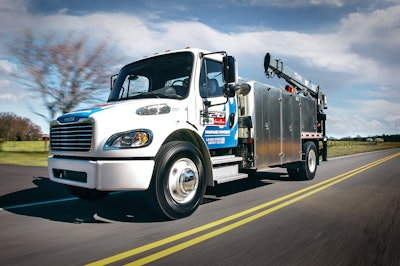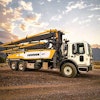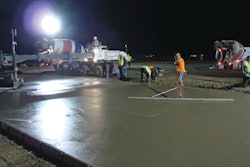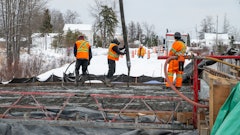
Propane has been a familiar fuel for decades on construction sites, powering construction mainstays like jobsite heaters, mobile light towers and portable generators. It offers numerous benefits to contractors that can help save money, increase productivity and reduce emissions.
For example, propane typically costs less than gasoline and diesel. Compared to gasoline and diesel, propane produces fewer emissions, allowing it to be used outdoors and indoors in well-ventilated facilities. The fuel is also portable and widely available across the country, an advantage when sites aren’t yet connected to utilities or are located beyond the reach of natural gas or electric utilities.
Contractors can compound these benefits for their jobsites and bottom lines by using propane as a one-fuel solution for multiple types of equipment. They may be surprised to learn how many machines are equipped to use the fuel. In fact, propane can already be used in multiple types of equipment common on concrete construction sites, including for materials handling, concrete work and transporting crews.
Materials Handling
Most concrete construction begins with moving materials to and from a site, such as detritus from demolitions, excavating dirt to level a site, or moving bagged concrete for smaller projects. Propane-powered power buggies and forklifts can be used to efficiently maneuver these materials across both indoor and outdoor sites.
Propane’s low emissions profile offers contractors a major advantage when using power buggies. The machines frequently are used indoors, outdoors or in semi-enclosed spaces where emissions from gasoline or diesel can be dangerous for crews. Propane can also allow work to continue on jobsites where electric utilities are unavailable, or where downtime for recharging batteries isn’t an option. Multiple manufacturers currently offer propane as an option for both tracked and wheeled buggies as well, allowing work to be completed in all types of terrain.
Propane forklifts are widely used for materials handling across multiple industries, making fuel and equipment availability likely no matter where a construction site is located. For contractors who need to rent equipment, this availability can be a great asset when working on a remote site. As long as the engines have been properly serviced and they’re in a well-ventilated environment, propane forklifts are perfectly suited to operate indoors as well.
Concrete Work
Many of the machines that make up the bread and butter for concrete construction and finishing equipment already have propane models available from multiple brands. Take propane-powered concrete grinders, polishers and floor strippers, for example. In addition to finishing concrete as part of commercial or residential construction, these machines are frequently used in renovation work and regular floor maintenance. New propane-powered grinders and polishers are safe for use indoors, and the machines often feature carbon monoxide sensors for even greater peace of mind during use.
Propane-powered concrete grinders and polishers allow cord-free operation, which can be an advantage on larger projects where there may be hundreds of feet between a machine and an electrical outlet, or in high-traffic areas where a cord can easily become a trip hazard. Additionally, propane can power industrial vacuums used alongside concrete finishing equipment to collect concrete dust during grinder use, an increasingly important piece in meeting silica dust regulations and keeping crews healthy.
Commercial concrete projects, and even large residential projects, often can benefit from the speed and efficiency of a power trowel, which helps finish and polish poured concrete. It’s increasingly common to see ride-on power trowels equipped with propane cylinders rather than fuel tanks for gasoline or diesel due to propane’s versatility on indoor and outdoor projects. Some manufacturers have even added duel-fuel options with both propane and gasoline to allow for longer usage time between refueling in addition to flexible usage on projects with both indoor and outdoor concrete work.
Propane can also power walk-behind concrete saws. Because these don’t rely on electricity for power, they can be used wet to limit silica dust. As with other machines, propane-powered concrete saws can be used indoors with proper ventilation and dust mitigation practices, making the equipment more flexible in meeting the needs of different projects compared with gasoline.
Transportation
Until considering a different fuel, contractors may not realize how much their businesses could save on fuel and maintenance costs by moving vehicle fleets away from gasoline and diesel. For contractors working on projects with long drive times, such as highway or bridge projects between cities, the savings can quickly become apparent.
On average, propane autogas costs between 30 percent and 50 percent less per gallon than gasoline and diesel. The price of propane traditionally falls between the prices of natural gas and oil, which greatly limits market price fluctuations compared to the wild price swings that gasoline and diesel often have in a given season. This cost consistency can be a major advantage in planning budgets for projects.
It’s likely there’s an EPA- or CARB-certified propane autogas conversion kit that can meet the needs of a contractor’s fleet, whether transporting crews in vans, using light- and medium-duty trucks to pull equipment trailers, or driving work trucks full of tools to and from sites. A number of high demand light- and medium-duty trucks and vans can be converted to run on propane autogas from gasoline, including chassis models upfitted with dump bodies, cranes or box options. Contractors will likely find that propane autogas is more efficient in fuel costs per mile compared to gasoline, and that the fuel has comparable power even when pulling loaded trailers.
Propane autogas vehicles also eliminate many of the challenges that contractors face if using diesel trucks. Propane autogas engines and emissions systems are less complex and eliminate the need for emissions fluids. The fuel doesn’t require complicated particulate filters to meet emissions regulations either, which often require additional downtime and costs to periodically clean and replace in diesel engines.
Multiple conversion kit partners are available across the U.S. to assist with converting existing fleets to propane autogas. Additionally, contractors with a wide service area where crews frequently drive beyond the range of a single tank fill may see benefits from using propane autogas bi-fuel vehicles. Certified propane autogas bi-fuel systems allow operators to choose either propane autogas or gasoline as the primary fuel for operation. This freedom of choice eliminates “range anxiety,” where operators or crews fear they might not find a place to refuel before running out of fuel.
Propane offers many benefits to construction jobsites and company budgets, and contractors can grow those benefits by incorporating different types of propane equipment into their fleets. To learn more about propane, visit Propane.com.
Jeremy Wishart is the director of off-road business development for the Propane Education & Research Council. He can be reached at [email protected].


















